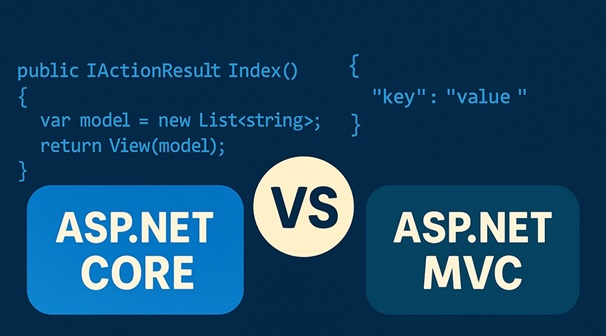When companies evaluate technologies for building modern web applications, the conversation often starts with technical features. But in reality, the choice of framework is not just a technical decision - it’s a business decision. Your web application is not a side project; it’s a revenue channel, a data engine, or even the very foundation of your product. Choosing the wrong stack can cost millions in lost opportunities, high maintenance bills, and security gaps.
This is where ASP.NET Core has emerged as a standout choice. Unlike traditional monolithic frameworks, it was designed from the ground up for speed, scalability, and cloud readiness. It isn’t just about building websites; it’s about running critical systems - from eCommerce storefronts handling thousands of daily transactions to logistics dashboards tracking real-time shipments, or enterprise ERPs that manage cross-department workflows.
Today, more than half of professional .NET developers (according to JetBrains surveys) rely on ASP.NET Core. And the reason is clear: it brings together performance, security, and flexibility in a way that aligns with modern business demands.
ASP.NET Core vs The Competition
Before reviewing why ASP.NET Core is really good, let’s take a quick look at other popular frameworks and why they often fall short in enterprise-grade scenarios:
- PHP (Laravel, Symfony) - Popular in small to mid-size projects, but generally delivers lower performance and weaker scalability compared to .NET, Java, or Go.
- Ruby on Rails - Known for rapid prototyping, but performance and scalability tend to lag behind modern frameworks in high-load systems.
- Node.js - Excellent for lightweight, real-time apps, but raw CPU-bound performance is weaker and requires extra engineering effort for complex enterprise workloads.
- Java Spring - Mature and powerful, but more resource-heavy and harder to optimize, leading to higher infrastructure costs compared to ASP.NET Core.
ASP.NET Core stands out as the best option for enterprises using the Microsoft ecosystem. It provides high-performance applications, long-term support, and seamless integration with cloud and enterprise tools.
1. Performance That Pays for Itself
Performance isn’t an abstract concept - it translates directly into money. A website that loads one second faster can boost conversions by several percentage points. An API that responds more efficiently can reduce server infrastructure costs dramatically.
ASP.NET Core delivers performance gains in several ways:
- Optimized compilation pipeline: The framework uses a highly efficient compiler that automatically optimizes code when it’s recompiled. Developers don’t need to manually fine-tune performance at every step - the framework does much of the heavy lifting.
- Lightweight and modular runtime: Unlike legacy .NET, ASP.NET Core runs leaner, which means fewer wasted resources and faster execution times.
- Asynchronous programming: The framework makes async/await patterns natural, allowing applications to handle thousands of concurrent requests without choking.
- Built on Kestrel, a high-performance, cross-platform web server optimized for async I/O.
For example, one logistics company we studied switched its freight-tracking API from a legacy stack to ASP.NET Core. The result? Response times dropped by 40%, which allowed them to run on fewer servers - saving thousands of dollars per month in hosting fees.
The key point: performance improvements aren’t just about user experience. They lower costs, improve scalability, and free engineering teams to focus on features rather than firefighting.
2. Modern Web UI with Razor Pages
User experience is no longer optional; it’s the battlefield where businesses win or lose customers. Yet many companies still struggle with bloated UI frameworks that slow down development and frustrate teams.
ASP.NET Core addresses this with Razor Pages, a feature designed to simplify the way developers build web UIs. Instead of splitting logic across multiple files (controllers, views, and templates), Razor Pages allows developers to focus on building self-contained, page-centric code.
What this means in practice:
- Cleaner structure: Each page carries its own logic, making the codebase easier to navigate and maintain.
- Faster onboarding: New developers can quickly understand and contribute without deciphering a tangle of MVC boilerplate.
- Quicker releases: Development cycles shorten, which directly impacts time-to-market.
Consider a healthcare provider building a secure patient portal. Using Razor Pages, they can roll out new modules (e.g., appointment booking, lab results, or secure messaging) without disrupting the rest of the system. For the business, this means faster adaptation to patient needs and competitive pressure.
In a market where customers expect constant improvements, the ability to iterate quickly and safely is a competitive advantage. Razor Pages helps make that a reality.
3. Cross-Platform by Design
One of the biggest limitations of earlier .NET frameworks was being tied to Windows servers. In today’s multi-cloud, containerized world, that’s no longer acceptable. Businesses need flexibility: run apps on Linux for cost efficiency, deploy containers in Kubernetes, or mix operating systems across hybrid environments.
ASP.NET Core solves this with true cross-platform support. Applications can be developed and deployed on Windows, Linux, or macOS without friction.
Why does this matter for business?
- Freedom of hosting: Companies can choose whichever OS is cheaper, faster, or better supported by their IT teams.
- Cloud compatibility: Whether you prefer Azure, AWS, or Google Cloud, ASP.NET Core is fully supported across all major providers.
- Code reusability: Applications can be migrated between environments without expensive rewrites.
A good example is a SaaS startup that launched its MVP on Windows because the internal team was comfortable with it. But as the business grew, they moved workloads to Linux containers running on Kubernetes for scalability and cost savings. Because they built on ASP.NET Core, the transition was seamless.
This flexibility protects companies from vendor lock-in and ensures their applications can evolve with business needs - whether that means moving to the cloud, running hybrid systems, or simply cutting hosting bills.
4. Security That Matches Enterprise Standards
In today’s environment, security is not a feature - it’s a baseline expectation. A single breach can cause millions in damages, reputational loss, and legal consequences. That’s why businesses evaluating frameworks must ask: does this technology protect my data and my customers by design?
ASP.NET Core offers multiple security advantages:
- Cross-Site Request Forgery (CSRF) protection: Built-in safeguards generate anti-forgery tokens automatically, reducing the chance of malicious cross-site attacks.
- Identity and authentication libraries: Out-of-the-box support for OAuth, OpenID Connect, and integration with Active Directory. This simplifies implementing secure logins across enterprises.
- Data protection APIs: Instead of forcing teams to invent encryption solutions, ASP.NET Core includes vetted APIs for handling sensitive information.
- These features are particularly crucial for industries like healthcare (HIPAA compliance), finance (PCI DSS), and e-commerce (customer payment data). By using ASP.NET Core, businesses aren’t just coding faster - they’re coding safer.
5. Architecture That Scales With You
Every growing company faces the same problem: systems that worked fine at 1,000 users begin to buckle at 10,000. The culprit is often architectural.
ASP.NET Core promotes clean architectural patterns such as the Model-View-Controller (MVC) and supports dependency injection (DI) natively. What does that mean in practice?
- Cleaner separation of concerns: Developers can isolate business logic from UI and infrastructure, making the application easier to extend.
- Built-in DI: No need for third-party frameworks like Ninject or Autofac. ASP.NET Core encourages decoupled design out of the box.
- Microservices and modular builds: Companies can break applications into smaller, manageable services. That means scaling only what you need - instead of scaling the entire monolith.
For example, a retail chain might have a single application for both inventory management and customer loyalty tracking. With ASP.NET Core, these functions can be separated into microservices. If inventory sees heavy seasonal demand, you can scale just that service without wasting resources on loyalty features.
The architecture is future-proof, ensuring your business doesn’t pay a technical debt tax as it grows.
6. Built for the Cloud Era
Cloud adoption is no longer optional; it’s the default. Gartner predicts that more than 70% of companies will be cloud-first in the coming years. The question isn’t if you’ll move to the cloud, but how prepared your applications are for it.
ASP.NET Core was designed with cloud-native principles:
- Containerization: Fully compatible with Docker and Kubernetes. Your app can be packaged once and deployed anywhere.
- Serverless readiness: Runs smoothly in Azure Functions, AWS Lambda, and other serverless platforms. Out-of-the-box integration with Azure and excellent compatibility with AWS & GCP.
- Cross-cloud support: Unlike legacy frameworks that locked you into Windows Server, ASP.NET Core works equally well across Azure, AWS, and GCP.
This flexibility helps businesses avoid vendor lock-in while optimizing costs. Imagine a SaaS company that wants to use Azure AI for analytics but prefers AWS for global content delivery. ASP.NET Core allows them to mix and match cloud providers without friction.
7. Cost Efficiency and Lower Total Ownership
Choosing a framework isn’t just about development speed. It’s about the total cost of ownership (TCO) across years of operation.
ASP.NET Core helps reduce costs in several ways:
- Open-source licensing: No expensive license fees - the framework is free to use.
- Because of cross-platforming it can be hosted on Linux. Hosting on Linux servers is typically 30–50% cheaper than Windows-only environments
- Reduced infrastructure needs: Performance optimization and async support lower the number of servers needed.
- Developer productivity: Features like Razor Pages, built-in DI, and better tooling reduce time-to-market, which saves on development costs.
- Future savings: A well-architected application avoids costly rewrites down the road.
- Backed by Microsoft and a large global developer community, guaranteed patches and updates.
- ASP.NET Core has Long-Term Support (LTS) releases (3 years).
One enterprise case study showed that moving a large e-commerce system to ASP.NET Core reduced annual hosting expenses by 30%, simply because the optimized runtime required fewer server resources.
8. Build Faster with the ASP.NET Core Rich Ecosystem
ASP.NET Core doesn’t exist in isolation - it comes with a powerful ecosystem of frameworks, tools, and libraries that accelerate development and reduce long-term costs:
- Entity Framework Core - a robust ORM for managing databases, handling migrations, and writing queries with strongly-typed LINQ instead of raw SQL. This cuts down on boilerplate code and minimizes the risk of database errors.
- Blazor - a modern way to build interactive, client-side web UIs using C# instead of JavaScript. This means teams can stay within the .NET ecosystem without context-switching between multiple programming languages.
- Frontend integration - ASP.NET Core connects seamlessly with popular frameworks like React, Angular, and Vue, giving developers the freedom to choose the best fit for the user interface while keeping a solid backend foundation.
- Best-in-class tooling - deep support in Visual Studio and Visual Studio Code provides debugging, profiling, refactoring, and performance optimization out of the box. Development teams get enterprise-level productivity without cobbling together dozens of third-party tools.
- NuGet ecosystem - thousands of pre-built, community-maintained packages are available for everything from authentication and logging to payment gateways. This accelerates development by letting teams reuse proven solutions instead of reinventing the wheel.
For businesses, the impact is tangible: faster development cycles, lower maintenance costs, easier hiring of developers familiar with the ecosystem, and fewer bugs thanks to battle-tested tools.
9. Why ASP.NET Core Is a Smarter Bet
When you step back, the case for ASP.NET Core is clear:
- It performs at a level that saves both money and frustration.
- It secures your business-critical data with enterprise-grade protections.
- It scales smoothly from startup MVPs to global platforms.
- It fits the cloud era, giving you flexibility to run where and how you want.
- It lowers total cost, both today and over the long term.
In other words, ASP.NET Core isn’t just a developer’s tool. It’s a strategic asset. Companies that adopt it are not simply “building apps” - they are laying down a resilient digital foundation that will carry them through growth, disruption, and new market opportunities.
Types of Software You Can Build with ASP.NET Core
ASP.NET Core is not limited to simple websites. It’s the foundation for building a wide range of high-performance, enterprise-ready applications:
- Web Applications - company portals, intranets, and customer self-service platforms that streamline communication and reduce operational costs.
- Microservices and Distributed Systems - modular architectures that let enterprises scale specific services independently, improving resilience and reducing infrastructure overhead.
- Real-Time Applications - live dashboards, IoT monitoring systems, trading platforms, and chat applications that require instant data updates.
- Cloud-Native Solutions - SaaS platforms, event-driven systems, and distributed applications built to run seamlessly on Azure, AWS, or Google Cloud.
- Enterprise Systems - ERP, HRM, CRM, and logistics applications that integrate across departments and support mission-critical processes.
- IoT & Edge Applications - secure and efficient apps that connect smart devices, sensors, and edge computing nodes.
- eCommerce Platforms - high-traffic online stores capable of handling thousands of transactions per second without performance bottlenecks.
At TwinCore, we leverage ASP.NET Core to build exactly these types of solutions. From custom enterprise platforms to SaaS products and eCommerce systems, our team ensures scalability, security, and long-term support tailored to business growth.
Conclusion: Building With Confidence
The frameworks you choose define the limits of your business. ASP.NET Core removes many of those limits. Whether you are running an e-commerce platform, a logistics system, a healthcare portal, or a next-generation SaaS, this framework combines reliability, performance, and cost efficiency in a way that makes sense for today’s digital economy.
If your current systems feel slow, fragile, or outdated, it may be time to rethink the foundation. ASP.NET Core offers not just features, but a path forward - one that aligns technology with business strategy.
And if you need guidance or expert hands to get there, seasoned ASP.NET developers at TwinCore have been doing this for more than 15 years. From greenfield builds to legacy modernization, we’ve seen what works - and more importantly, what doesn’t.

 LinkedIn
LinkedIn
 Twitter
Twitter
 Facebook
Facebook
 Youtube
Youtube







